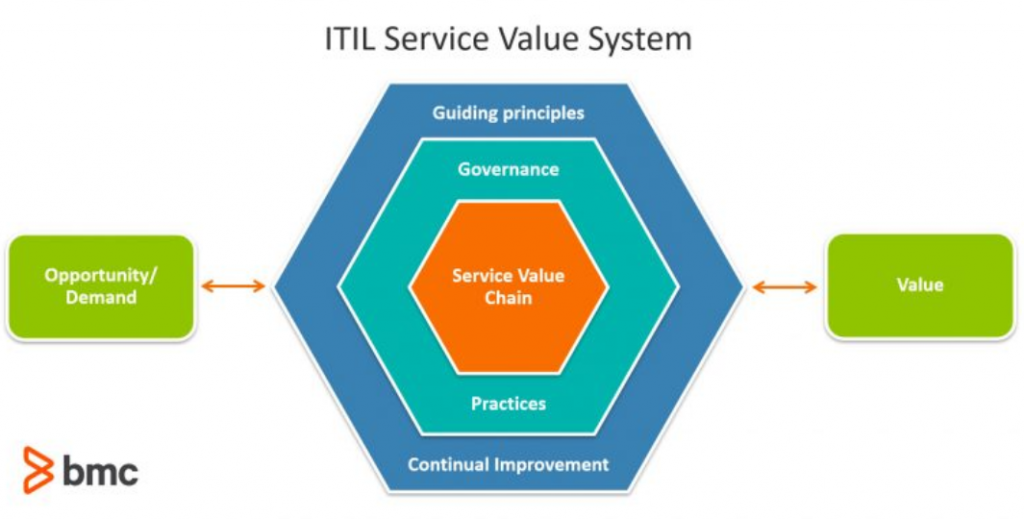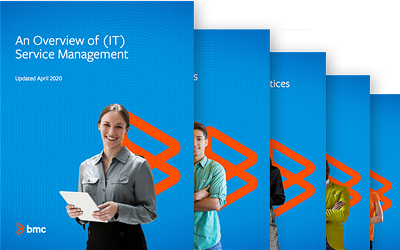ITIL® certification tops nearly every list of must-have IT certifications, and for good reason. As a framework for IT service management, ITIL can help organizations manage risk, increase productivity, reduce cost of service development and deployment, strengthen customer relations, and build an agile IT environment.
With that, you might be confused about how ITIL relates to ITSM, or what they even are in the first place. You may also be wondering what the rollout of ITIL 4 might mean for ITIL 3, as well as how that will affect those currently in the middle of certification in version 3. This complete guide on ITIL 4 certifications and other ITSM certifications and career paths will help you navigate these topics and more.
Download Now: ITIL 4 Best Practice e-Books
These all-new for 2020 ITIL e-books highlight important elements of ITIL 4 best practices. Quickly understand key changes and actionable concepts, written by ITIL 4 contributors.
ITIL and ITSM Explained
So, you ask, what is the difference between ITIL and ITSM? In short, ITIL is a set of rules and best practices for IT service management. ITSM is the entirety of all IT-related activities in an organization, including planning, designing, delivering, operating, and controlling. ITSM is customer-focused, with emphasis on measuring and improving processes.
ITIL is a framework for ITSM. The processes, tasks, and procedures that make up ITIL are intended to be integrated with the organization’s strategy, so they are not organization-specific. Axelos currently owns ITIL, maintaining the ITIL framework and accrediting training and examination institutes. There are hundreds ITIL Accredited Training Organizations (ATOs) with the certification exam administered at the end of the training course or by a partnering examination institute.
In spring 2019, Axelos introduced ITIL v4, a clear transition from the previous ITIL v3 structure to a newer one.
ITIL v3 lifecycle
ITIL v3 is divided into five core phases, each covering a different ITSM lifecycle:
- Service Strategy focuses on first defining services as strategic assets, then producing a coherent strategy.
- Service Design includes assessing business management processes in order to develop or improve service offerings.
- Service Transition covers the transition from development to production operations, including testing and quality control.
- Service Operation defines how to manage services once they are in production/use, covering operation processes and incident response.
- Continual Service Improvement defines new requirements for the preceding phases of ITIL based on operational feedback and service levels.
ITIL v4 lifecycle
The key components of the ITIL v4 framework are the ITIL service value system (SVS) and the four dimensions model. The core components of the ITIL SVS are:
- The ITIL service value chain, which provides a flexible operating model for the creation, delivery, and continual improvement of services
- The four dimensions:
- ITIL practices
- ITIL guiding principles
- Governance
- Continual improvement

What is an ITIL certification?
ITIL certifications demonstrate that the candidate is educated in ITSM best practices, utilizing processes, terminology, and methods that are common in modern IT. ITIL-certified professionals are in high demand, as they possess the skills to grow and transform the business.
Why earn your accreditation or certification?
The benefits of earning your accreditation or certification are invaluable. With an ITIL certification, you can:
- Earn a solid foundation in product knowledge
- Accelerate your professional development
- Increase your earning potential
- Improve productivity
- Enhance your credibility
- Become a leading, solutions-oriented professional
Benefits aren’t limited to the certified individual. Organizations see far-reaching advantages from adopting ITIL, including:
- Aligning IT to your business and providing services that better meet the needs of their customers
- Improving the quality of the IT services you deliver by understanding the required levels of availability, security, capacity, and continuity, and then planning solutions that are able to deliver these
- Decreasing the cost of delivering IT by reducing wasted effort
ITIL certifications
The most popular and important cross-platform ITSM certification, the ITIL certification scheme provides a modular approach to the ITIL framework and is comprised of a series of qualifications focused on different aspects of ITIL best practice to various degrees of depth and detail. This tiered structure offers flexibility for candidates relating to their specific focus of discipline as well as key areas of interest.
Candidates that are studying the ITIL v3 Foundation level are encouraged to move straight to ITIL 4. For those that are further in the ITIL v3 journey, you may stay on that path to build the skills you need. There are five certification levels within the ITIL v3 scheme:
- Foundation
- Practitioner
- Intermediate
- Expert
- Master
Although ITIL v3 is still applicable, it will likely be discontinued years down the road, after the market transitions to ITIL v4. So, let’s explore the different certification levels that comprise ITIL v4.
ITIL v4 certifications
The first ITIL 4 certification to become available was the Foundation level, with the following levels due for release later in 2019 and in 2020. The ITIL v4 certification scheme is aligned with ITIL v3 and has been streamlined to provide clear paths for practitioners to continue their ITIL journey. There are four certification levels within the ITIL v4 scheme:
- Foundation
- ITIL 4 Managing Professional
- ITIL 4 Strategic Leader
- Master
ITIL Foundation
The ITIL 4 Foundation certification introduces the ITIL framework and enables candidates to look at ITSM through an end-to-end operating model for the creation, delivery and continual improvement of tech-enabled products and services. The certification can help candidates who require a basic understanding of the ITIL framework, want to use ITIL to enhance ITSM, or those whose organization has adopted ITIL.
Those who earn a certification in ITIL 4 Foundation will understand the following:
- A holistic approach to the facilitation of co-creation of value with customers and other stakeholders in the form of products and services
- The guiding principles of ITIL
- The four dimensions of Service Management
- Key concepts from Lean, Agile, DevOps, and why these are important to deliver business value
- How ITIL practices described in ITIL 4 will maintain the value and importance provided by the current processes
ITIL 4 Managing Professional
ITIL 4 Managing Professional (ITIL MP) follows four different modules:
- ITIL 4 Specialist Create, Deliver, and Support. This module covers the ‘core’ service management activities and expands the current scope of ITIL to cover the ‘creation’ of services. It focuses on the integration of different value streams and activities to create, deliver, and support IT-enabled products and services while also covering supporting practices, methods and tools. This module enables IT practitioners to continue to deliver innovative yet reliable tech-enabled services to their customers in an increasingly competitive market.
- ITIL 4 Specialist Drive Stakeholder Value. This module covers all types of engagement and interaction between a service provider and their customers, users, suppliers, and partners. It focuses on the conversion of demand into value via IT-enabled services. The module covers key topics such as SLA design, multi-supplier management, communication, relationship management, CX and UX design, and customer journey mapping. It provides candidates with the tools to increase stakeholder satisfaction which is integral to business success in the current competitive landscape.
- ITIL 4 Specialist High Velocity IT. This module explores the ways in which digital organizations and digital operating models function in high velocity environments. This module includes the use of working practices such as Agile and Lean, and technical practices and technologies such as Cloud, Automation, and Automatic Testing, focusing on rapid delivery of products and services to obtain maximum value. This module is aimed at IT managers and practitioners involved in digital services or digital transformation projects working within or towards high velocity environments.
- ITIL 4 Strategist Direct Plan and Improve. This module provides individuals with the practical skills necessary to create a ‘learning and improving’ IT organization, with a strong and effective strategic direction. The module covers the influence and impact of Agile and Lean ways of working, and how they can be leveraged to an organization’s advantage. ITIL 4 Strategist Direct Plan and Improve is aimed at managers of all levels involved in shaping direction and strategy or developing a continually improving team.
ITIL 4 Strategic Leader
ITIL 4 Strategic Leader (ITIL SL) is a stream of two modules:
- ITIL 4 Strategist Direct Plan and Improve. This module covers both practical and strategic elements of managing teams of all levels along with methods of planning and delivering continual improvement with agility. Like the fourth module in the ITIL 4 Managing Professional certification, the ITIL 4 Strategist Direct Plan and Improve is still a vital component to the ITIL 4 Strategic Leader certification.
- ITIL 4 Leader Digital and IT Strategy. This module focuses on the alignment of digital business strategy with IT strategy. The module also covers how disruption from new technologies are impacting organizations in every industry and how business leaders should respond. ITIL 4 Leader Digital and IT Strategy will help current and aspiring IT leaders build and implement digital strategies that can face these challenges and drive success.
ITIL Master
The ITIL Master certification validates the candidate’s ability to apply the principles, methods, and techniques from ITIL in the workplace. To earn ITIL Master certification, you must be able to explain and justify how you personally have selected and applied a range of knowledge, principles, methods, and techniques from the ITIL Framework and supporting management techniques to achieve desired business outcomes in one or more practical assignments.
This certification does not have a fixed syllabus or training course as each candidate will have different experiences that are highly personal. To be eligible for the ITIL Master certification, candidates must:
- Have earned the ITIL Expert certificate
- Have worked in ITSM with 5+ years’ experience in leadership, managerial, or higher management
- Ensure extensive practical hands-on experience with ITIL
- Demonstrate active involvement in implementation of the practices
AXELOS will release more details on ITIL 4 Master in late 2019.
ITIL certifications for digital businesses
ITIL certifications are some of the top IT certifications in the industry, with competitive salaries to match. Having an ITIL certification could be the first step in landing a job, obtaining a promotion, or advancing your career to the next level, especially if you are considering becoming CTO or CIO.
Many organizations are already beginning to adopt ITIL for their business, are you ready to join them? If so, the BMC Certification Program from BMC Education Services offers a full range of ITIL courses in addition to complete ITSM courses offering participants validation in technical competencies and expertise so you can effectively plan, deploy, and support solutions from BMC.





